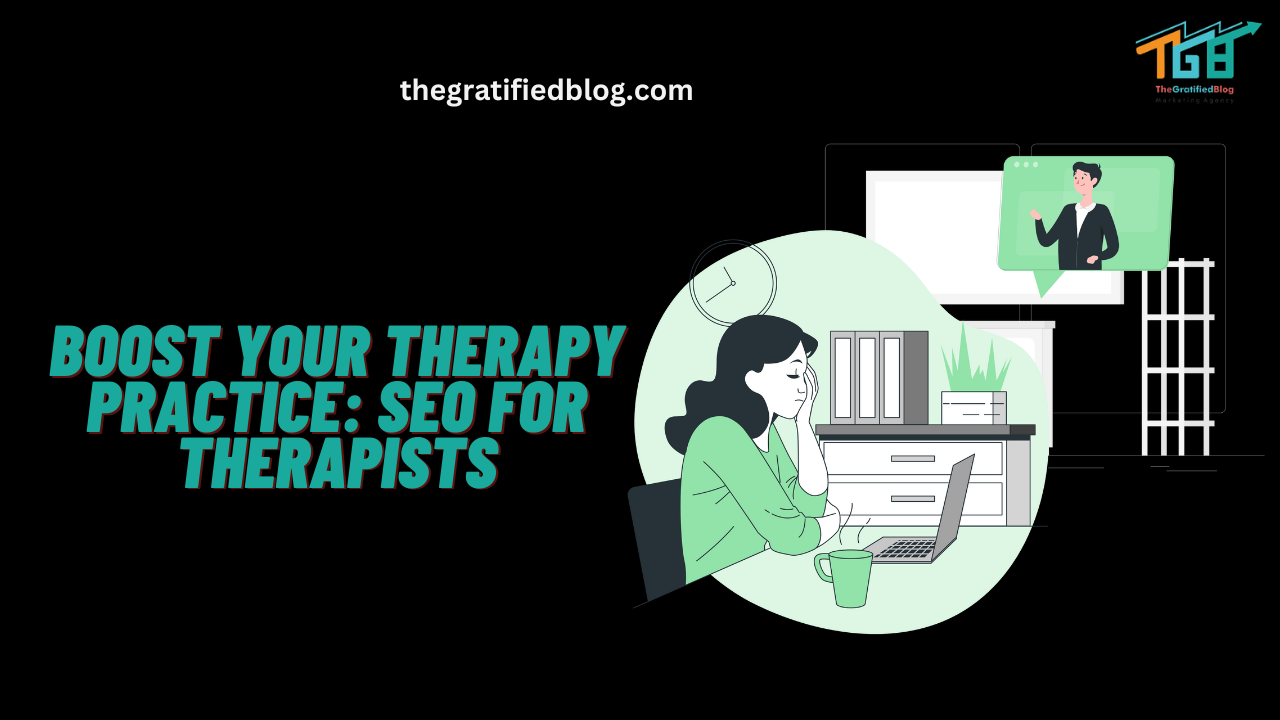
In today’s digital age, online presence, including therapy practices, is essential for any business or profession. Potential clients increasingly search the internet for therapists and mental health professionals.
This shift in consumer behavior makes search engine optimization (SEO) a crucial tool for therapists looking to broaden their customer reach and enhance their practice’s visibility.
For therapists specializing in SEO for therapists, knowing how to utilize these techniques effectively can be a game-changer in connecting with more clients.
In this article, we’ll explore how therapists can leverage the potential of SEO to enhance their therapy practice and connect with more clients.
What Is SEO & Why Is SEO Important For Therapists?
SEO is a digital marketing strategy that boosts a website’s visibility on search engines like Google. It encompasses optimizing various elements, including content, utilizing strategic keywords and meta tags to attain elevated positions in search engine results pages (SERPs).
The main objective of SEO is to draw in organic (unpaid) traffic to a website, increasing its online presence and potential for conversions.
SEO techniques evolve constantly, adapting to search engine algorithms and user behavior, making it a crucial aspect of online marketing. Successful SEO drives targeted traffic and boosts a site’s competitiveness in the digital landscape.
Now let’s understand why its important for therapist:

- Increased Online Visibility: When someone searches for a therapist or related services in your area, you want your practice to appear prominently in the search results. SEO aids in accomplishing this by optimizing your website to rank higher in relevant searches.
- Credibility And Trust: Websites ranking at the top of search results are frequently regarded as more trustworthy and credible. By optimizing your website for search engines, you enhance your practice’s online reputation.
- Competitive Advantage: Many therapists now have an online presence, and the competition is fierce. SEO can offer a competitive advantage by guaranteeing potential clients find your practice before others.
- Targeted Traffic: SEO enables you to target specific keywords and demographics, ensuring that Those discovering visitors to your website are more likely to be interested in your services. This leads to higher conversion rates.
- Cost-Effective Marketing: Unlike conventional advertising approaches, SEO is cost-effective in the long run. Once your website is well-optimized, it can continue to attract organic traffic without ongoing expenses.
How Can SEO Help Therapists?
Better Ranking In Local Searches

For therapists, local SEO is essential. Potential clients often search for therapists in their vicinity. Optimizing your website for local keywords and generating a Google My Business profile can help your practice appear in local search results.
This enhanced visibility makes it easier for people in your area to find your services, increasing the likelihood of new clients discovering your practice.
Local SEO can boost your online reputation by showcasing positive reviews and ratings and building trust with potential clients.
It also lets you provide essential information like your location, contact details, and working hours, streamlining the appointment booking process. Investing in local SEO can significantly boost your therapist practice’s online presence and accessibility to your local community.
Improved User Experience

A crucial aspect of SEO is ensuring that your website provides an excellent user experience. A well-structured, mobile-friendly, and fast-loading website not only pleases search engines but also keeps visitors engaged, reducing bounce rates.
When therapists optimize their websites for SEO, they prioritize content organization, making it easier for clients to navigate and find valuable information.
This enhanced usability fosters a positive first impression, establishing trust and credibility. It also helps therapists showcase their expertise and services effectively, which can lead to higher conversion rates and more clients seeking therapy services.
Overall, SEO-driven improvements in user experience contribute to a therapist’s online visibility and the growth of their practice.
Content Marketing

Content Marketing is a powerful tool for therapists looking to leverage SEO. Through SEO, therapists can create a solid online presence by producing valuable content related to mental health and therapy.
Therapists can establish themselves as authoritative figures by crafting informative blog posts, engaging videos, or helpful resources.
It builds trust with potential clients and attracts more visitors to their websites. SEO-driven content marketing helps therapists reach a wider audience, increasing visibility and credibility in the competitive mental health industry.
It allows therapists to address common questions and concerns, showcasing their expertise and compassion and ultimately helping individuals find the support they need.
SEO empowers therapists to make a meaningful impact through effective content marketing strategies.
Targeted Keywords

Recognizing the keywords and phrases that potential clients may employ when searching for therapy services, like “seo services for therapists,” is crucial for SEO.
Incorporating these keywords into your website content enhances the likelihood of achieving favorable rankings in search results. When people search for therapists online, they often use specific terms related to their needs, such as “anxiety therapy” or “couples counseling.”
SEO helps therapists ensure their websites appear prominently when these relevant keywords are entered, driving more organic traffic.
SEO can enhance a therapist’s online visibility, making connecting with individuals seeking their specific expertise easier. Therapists can draw in clients by optimizing their websites for search engines to a more targeted audience and Establishing themselves as credible authorities in their respective fields.
This enhanced visibility can result in more clients, fostering a thriving practice and helping therapists reach those needing their therapeutic services.
SEO Strategies For Therapists
Search Engine Optimization (SEO) is crucial for therapists and mental health professionals to increase online visibility and attract potential clients. Here are some effective SEO strategies for therapists:
Keyword Research
Therapists must conduct comprehensive keyword research to pinpoint their niche’s most pertinent and high-traffic keywords. Leveraging tools such as Google Keyword Planner can significantly assist this crucial process.
Identifying keywords that resonate with your therapy services and target audience is imperative. By honing in on these keywords, therapists can optimize their website content, blog posts, and meta tags to enhance search engine visibility.
This strategic approach ensures that potential clients seeking therapy services can quickly discover your website, enhancing your online presence and facilitating connections with those needing therapeutic support. Effective keyword research is the first step toward a successful SEO campaign for therapists.
Optimize Your Website
Begin by ensuring that your website is well-structured, with a user-friendly navigation system that makes it easy for visitors to find the information they need.
It should also be mobile-responsive, as many users access websites on their smartphones. Incorporate keywords strategically throughout your website, especially in titles, headers, meta descriptions, and content.
These keywords should be relevant to your therapy practice and your services. Focus on creating high-quality, informative Create content that caters to the needs and concerns of your target audience.
Aim for fast loading times to enhance user experience, as websites with slow loading times can increase bounce rates. Consistently update and maintain your website to remain current and aligned with search engine algorithms.
By implementing these SEO strategies, therapists can enhance their online visibility and effectively reach potential clients.
Local SEO
Local SEO is a crucial strategy for therapists to enhance their online visibility. Establish a robust Google My Business profile, ensuring that your practice’s name, address, and phone number (NAP) remain consistent and accurate across all online platform directories. Correct and consistent across all online directories.precise Ensure that your practices Maintain accurate and consistent information for your practice across all online directories and listings.
This consistency helps search engines like Google trust your business information. Encourage content clients to share reviews on your Google My Business page, as positive reviews can boost your local search rankings and credibility.
Enhance your website for local search by incorporating location-specific keywords into your content and metadata. Employ schema markup to furnish search engines with structured data about your practice’s location and services.
Create valuable, location-based content, such as blog posts or resources tailored to your local community, to engage with potential clients in your area.
Use platforms like Facebook, Instagram, Twitter, and LinkedIn to engage with local online communities to foster connections and effectively promote your therapy services.
Content Creation
Regularly publishing high-quality content is paramount to achieving visibility in search engine results. Therapists can demonstrate their expertise and connect with a broader audience by crafting insightful articles, blog posts, or videos that address common mental health concerns, therapy techniques, or self-help advice.
It helps boost their search engine rankings and positions them as trusted authorities in the mental health field. Consistency is critical, as search engines favor websites that frequently update their content.
Optimizing content with pertinent keywords and delivering valuable information can attract and engage potential clients, ultimately driving organic traffic to the therapist’s website and enhancing their online presence.
Link Building
To enhance your online presence and increase your website’s authority, it’s essential to seek opportunities for building high-quality backlinks.
One practical approach is guest posting on relevant websites, where you can contribute valuable content while including links to your site.
Contacting local directories and getting listed can boost your local search visibility. Partnering with other professionals in related fields can also lead to valuable backlinks, as partnerships and referrals can naturally generate inbound links.
Ensuring these backlinks are from reputable sources relevant to your therapy practice is crucial to SEO success. By consistently building solid backlinks, you can improve your therapist’s website’s search engine ranking and attract more potential clients.
The Benefits Of SEO For Therapists
Search Engine Optimization (SEO) can significantly benefit therapists and mental health professionals in growing their online presence, reaching a broader audience, and drawing in potential clients.
Here are some of the key benefits of SEO for therapists:
Increased Client Base

SEO can help you attract more clients, including those actively seeking therapy services in your area. By refining your website and online content for pertinent keywords, such as “SEO for therapists,” Enhance your visibility in search engine results by optimizing your website.
This means that when potential clients search for terms like “therapist near me” or “counseling for anxiety,” your practice is more likely to appear at the top of the search results. Moreover, SEO enables you to focus on particular demographics and niches within the therapy field, ensuring you reach the right audience.
This can increase conversion rates, as individuals discovering your website via search engines are often already interested in your services.
As a result, your client base can grow steadily, ultimately increasing your revenue and helping you build a thriving therapy practice.
Investing in SEO for therapists can yield long-term benefits, establishing your online presence and credibility in the competitive field of therapy services.
Cost-Efficiency

SEO offers therapists a cost-effective marketing strategy that outshines traditional advertising methods. Unlike paid ads or print media, SEO’s long-term benefits continue to compound over time, offering an excellent return on investment.
By optimizing their websites for search engines, therapists can attract organic traffic without incurring ongoing advertising expenses related to promoting their services as therapists.
This cost-efficient approach allows therapists to allocate their resources more effectively, whether investing in their practice or reaching a wider audience.
As the digital landscape evolves, SEO adapts, ensuring therapists remain competitive and visible online without breaking the bank. SEO for therapists is an innovative and sustainable marketing solution in an era of tight budgets.
Brand Authority

SEO for therapists is an invaluable advantage that goes hand in hand with establishing brand authority. When your website performs well in search engine results for keywords like “SEO for therapists,” it signals expertise and trustworthiness to potential clients.
This authority enhances your professional reputation, positioning you as a trustworthy authority in the mental health domain.
Potential clients are more inclined to avail of your services when they perceive you as an industry leader in SEO for therapists. A solid online presence achieved through SEO increases visibility and cultivates a sense of reliability.
As prospective clients search for therapists who specialize in SEO for therapists, they often prioritize those who appear at the top of search results.
This prominence portrays you as a go-to expert in your niche, ultimately increasing client trust and confidence in your practice.
Investing in SEO for therapists can significantly elevate your brand authority, helping you stand out in a competitive field and attract more clients seeking your expertise in therapy and SEO.
Data-Driven Decision Making

SEO empowers therapists with invaluable data and insights into their website’s performance. Therapists can gather data on website traffic, user behavior, and keyword effectiveness through tools like Google Analytics and keyword tracking.
This data-driven approach allows therapists to make informed decisions about their online presence, identifying what strategies are working and where improvements are needed, especially in the context of SEO for therapists.
By understanding which keywords and content resonate with their target audience, therapists can optimize their websites for better visibility and engagement in the competitive SEO world for therapists.
This not only enhances their online presence but also helps tailor their therapy services to meet the needs of their clients better, ultimately leading to improved client satisfaction and business success.
In a competitive field like therapy, data-driven decision-making through SEO for therapists can be a game-changer, ensuring therapists stay relevant and effective in the digital landscape.
Conclusion
In the digital era, an effective online presence is crucial for therapists aiming to expand their practice and reach a broader audience.
SEO offers a powerful tool to enhance your visibility, credibility, and client base. By implementing the correct SEO strategies, therapists can optimize their websites, attract more clients, and ultimately boost the success of their therapy practice.
Embracing SEO is not just a choice but necessary for therapists looking to thrive in the modern healthcare landscape.








No Comments